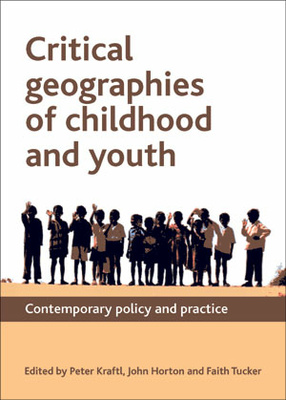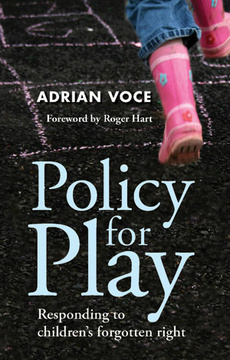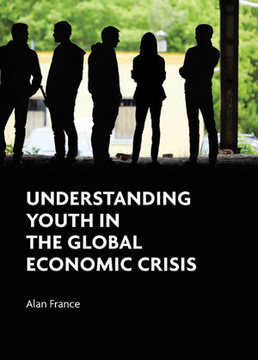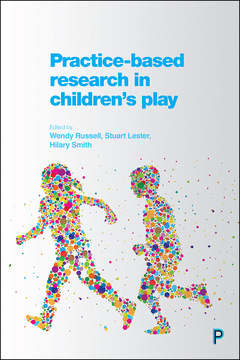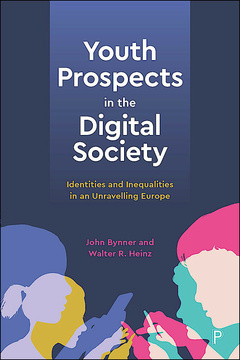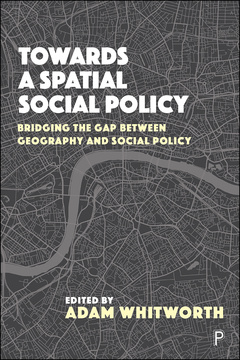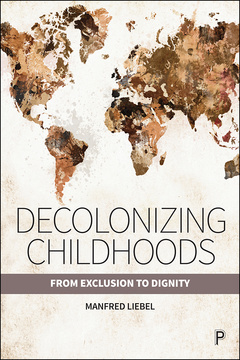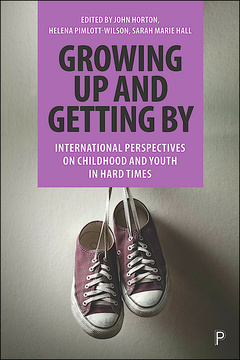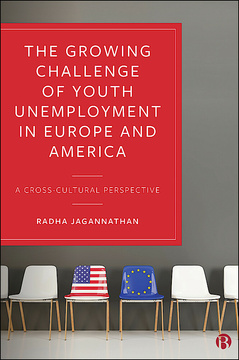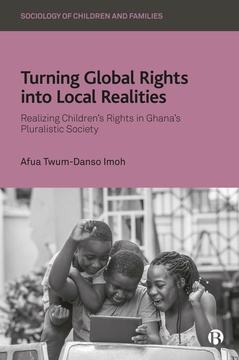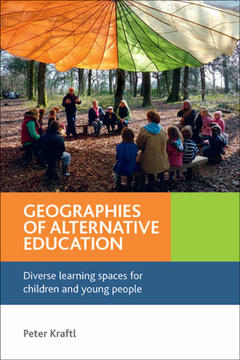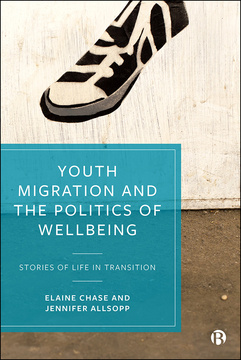Critical Geographies of Childhood and Youth
Contemporary Policy and Practice
Edited by Peter Kraftl, John Horton and Faith Tucker
Published
Mar 21, 2012Page count
296 pagesISBN
978-1847428455Dimensions
240 x 172 mmImprint
Policy PressPublished
Mar 21, 2012Page count
296 pagesISBN
978-1847428462Dimensions
240 x 172 mmImprint
Policy PressPublished
Mar 21, 2012Page count
296 pagesISBN
978-1447308249Imprint
Policy PressPublished
Mar 21, 2012Page count
296 pagesISBN
978-1447308256Imprint
Policy PressThis original book explores the importance of geographical processes for policies and professional practices related to childhood and youth. Contributors from a wide range of disciplinary backgrounds explore how concepts such as place, scale, mobility and boundary-making are important for policies and practices in diverse contexts. Chapters present both comprehensive cutting-edge academic research and critical reflections by practitioners working in diverse contexts, giving the volume wide appeal. The focus on the role of geographical processes in policies and professional practices that affect young people provides new, critical insights into contemporary issues and debates. The contributions show how local and national concerns remain central to many youth programmes; they also highlight how youth policies are becoming increasingly globalised. Examples are taken from the UK, the Americas and Africa.
The chapters are informed by and advance contemporary theoretical approaches in human geography, sociology, anthropology and youth work, and will be of interest to academics and higher-level students in those disciplines. The book will also appeal to policy-makers and professionals who work with young people, encouraging them to critically reflect upon the role of geographical processes in their own work.
"An outstanding critical analysis of youth policy that puts geography centre-stage. Drawing on diverse case studies, the book interweaves theory and practice - listening to and informing practitioner, academic and young people's perspectives." Rachel Pain, University of Durham
"This edited collection is a welcome addition to literature within children’s geographies due to its unique focus on policy and professional practice in relation to children and young
people." Social and Cultural Geography
"Welcome addition to literature within children's geographies due to its unique focus on policy and professional practice" Sarah Mills, Department of Geography Loughborough University
“Critical reading for a robust understanding of the lives of children and young people.” – Journal of Social Policy
"Kraftl and his colleagues bring together a fine collection of essays that highlight the importance of scales, spaces, places and networks to the ways in which policies about young people are created and put into practice. At its core, this book is about the relevance of studying children's geographies. It adds an important policy dimension to the growing literature on children's geographies, arguing that discourses on policy are almost always spatialized. One of the most exciting aspects of this book comes from a focus in some chapters on how policy can take place through the agency of young people. " Stuart C. Aitken, San Diego State University,
"How a nation treats its youth determines how those young people will treat their nation. This skilfully edited text critically and theoretically interrogates the complex spatialities of youth and education policies; invaluable reading for those working with, and caring for, children and young people." Tracey Skelton, National University of Singapore
Peter Kraftl is a Senior Lecturer in Human Geography at the University of Leicester.
John Horton is a Senior Lecturer in Geography, based in the Centre for Children and Youth at The University of Northampton.
Faith Tucker is a Senior Lecturer in Geography, based in the Centre for Children and Youth at The University of Northampton.
Editors' introduction: critical geographies of childhood and youth ~ Peter Kraftl, John Horton and Faith Tucker; Part I (Inter)national youth policies: politics and practices of spatial translation: Making 'youth publics' and 'neuro-citizens': critical geographies of contemporary education practice in the UK ~ Jessica Pykett; Youth policy, neoliberalism and transnational governmentality: a case study of Lesotho and Malawi ~ Nicola Ansell, Flora Hadju, Elsbeth Robson, Lorraine van Blerk, Elodie Marandet; 'Brighter futures, greener lives': children and young people in UK sustainable development policy ~ Bethan Evans and Emma-Jay Honeyford; Places to go, things to do and people to see: space and activity in English youth work policy ~ Richard Davies; Part II Education and employment policies: learning beyond schools and schools beyond learning: The place of aspiration in UK widening participation policy: moving up or moving beyond ~ Gavin Brown; School choice versus social cohesion: examining the ways education policies shape children's geographies in the UK ~ Susie Weller; Lunchtime lock in: territorialisation and UK school meals policies ~ Jo Pike and Derek Colquhoun; Informal education in compulsory schooling in the UK: humanising moments, utopian spaces? ~ Isabel Cartwright; Part III Intervening in 'everyday life': scales, practices and the 'spatial imagination' in youth policy and professional practice: A free for all? Scale and young people's participation in UK transport planning ~ John Barker; Including young people in heritage conservation in Brazilian southern cities: the case of Pelotas ~ Laura Novo de Azevedo; Anchoring identity: the construction of responsibility for and by young offenders in the US ~ Alexandra Cox; Parenting policy and the geographies of friendship: encounters in an English Sure Start Children's Centre ~ Eleanor Jupp; Youth homelessness policy in Wales: improving housing rights and addressing geographical wrongs ~ Peter K. Mackie; Childhood in South Africa in the time of HIV/AIDS: reconsidering policy and practice ~ Amy Norman; Part IV Concluding reflections: Concluding reflections: what next and where next for critical geographies of youth policy and practice? ~ Peter Kraftl, John Horton and Faith Tucker.








